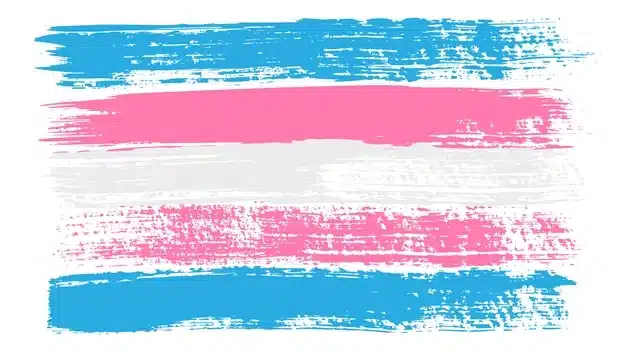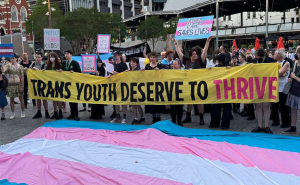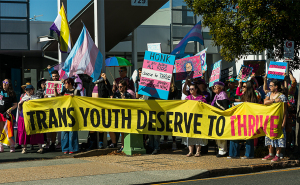OPINION
Rodney Croome AM is a long-time LGBTIQ+ rights advocate.
In 2019 Tasmania passed the most inclusive, progressive gender recognition law in the world.
The new law allowed for complete self-identification and for gender to be removed from birth certificates entirely. It also created the nation’s strongest bullying and discrimination protections for trans and gender diverse people.
We did this despite fierce opposition from the Government.
The key to our success was supporting trans people and their parliamentary allies to lead every aspect of the campaign, providing regular briefings of MPs and the media, and developing a compelling narrative about Tasmania emerging from a dark past when trans people were considered criminals under laws against cross-dressing.
I know the political and historical situation is different in other states, including WA. But I hope my experience working on trans law reform gives me some insight into how to make real change.
I share the anxiety many trans and gender diverse (TGD) West Australians have about the WA Government’s trans law reform.
Of course, it’s welcome that the old Gender Reassignment Board will be scrapped. It has been cruel and oppressive. But replacing it with a law that still requires a TGD person to have a medical professional validate who they are is deeply concerning.

The dilemma then is whether to accept the proposed reform as a step forward, or to condemn it as unacceptably regressive.
On the one hand, Misty Farquhar from Rainbow Futures has said “it’s a good step forward” from “a Government committed to making life better for LGBTIQA+ people”.
On the other hand, long-time LGBTIQA+ advocate, Brian Greig, has said it is a step backwards and sets a bad precedent for other overdue LGBTIQA+ law reform in WA such as a ban on LGBTIQA+ discrimination in faith-based schools and services
Alex Wallace from Queer Liberation Boorloo, responded to Greig saying that whatever problems the legislation has, we can’t forget that “the Gender Reassignment Board is, frankly, f**king evil.”
My response to this debate is that we must learn from WA history.
The proposed law will replace an old, discredited form of discrimination (requirement for surgery and permission from the Gender Reassignment Board before a birth certificate can be amended) with a new, objectionable but more widely-tolerated form of discrimination (approval from a doctor or psychologist for an affirming certificate).
The proposed law not only falls far short of most other states (especially Tasmania). It will give new life to the old prejudice that trans people can’t be trusted, are potentially threatening and should have to prove who they are.
This is exactly what happened with the decriminalisation of homosexuality in Western Australia in 1989.
An old, discredited and unenforceable law criminalising all gay sex with a maximum 14 year gaol term (with or without whipping) was replaced with a higher age of consent for gay sex and a ban on “promoting homosexuality”.
These new provisions were proposed by Peter Foss MLC in return for his support for decriminalisation. The Foss amendments became infamous globally as a forerunner of laws against the “promotion of homosexuality” in places like Russia.
At the time, WA advocates said decriminalisation with the Foss compromise was a step forward and the regrettable but necessary amendments could be repealed soon.
But it took 12 years for the higher consent law and promotion ban to be repealed.
In the meantime the new, more up-to-date and publicly-tolerated restrictions were enforced in a way the old gay sex ban hadn’t been for many years.
The new law gave a fresh lease of life to old prejudices associating gay men with child abuse and “recruitment”.

WA history shows that sometimes a compromise that, on the surface, looks like “a step forward” is actually a step backwards.
I believe the current proposal fits that category. It will legitimise precisely those myths that are at the core of the current global backlash against TGD people.
It’s no coincidence that WA Attorney-General, John Quigley, perpetuated a baseless, demonising, anti-trans myth when he said on radio “you don’t want someone who, for example, has been convicted of a nasty aggravated sexual offence, then changing gender so they can access women only areas.”
This is precisely the kind of unfounded fear-mongering that underlies and is reinforced by Quigley’s proposed law.
Not only is Greig right that Quigley’s Quagmire sets a bad precedent for other overdue reforms, it also threatens to make the situation for TGD people worse by legitimising the very prejudices they battle every day.
So, what’s the best response to Quigley’s law?
My advice would have been to contest it at every step: send letters and opinion pieces to the papers explaining why it’s a bad law, ensure amendments are put in both houses even if they may be lost, call for an inquiry to look at the bill’s deficiencies, start a petition calling for better reform, insert a clause that calls for a review as soon as possible, use every opportunity to explain why self-identification is so important.
I have recently been involved in a similar campaign against the Tasmanian Government’s conversion “ban”.
It has so many loopholes it doesn’t actually ban anything. It will actually make things worse by attracting conversion practitioners to Tasmania to take advantage of the loopholes.
By not wasting time talking about “steps forward” we have instead been able to explain what good conversion legislation looks like.
I understand Quigley’s law may pass regardless of any campaign against it. But by kicking up more of a fuss activists could have ensured the time between its passage and when future politicians return to it will be as short as possible.
I’m the first to acknowledge that whether to accept or reject Quigley’s law isn’t my decision to make.
That decision should lie with TDG West Australians. But my last piece of advice is that as many TGD people as possible should be involved in that decision because it affects them all.
At the very least, we should have seen TGD West Australians surveyed about whether Quigley’s law should be accepted, rejected or something in between, and their collective decision acted on.



